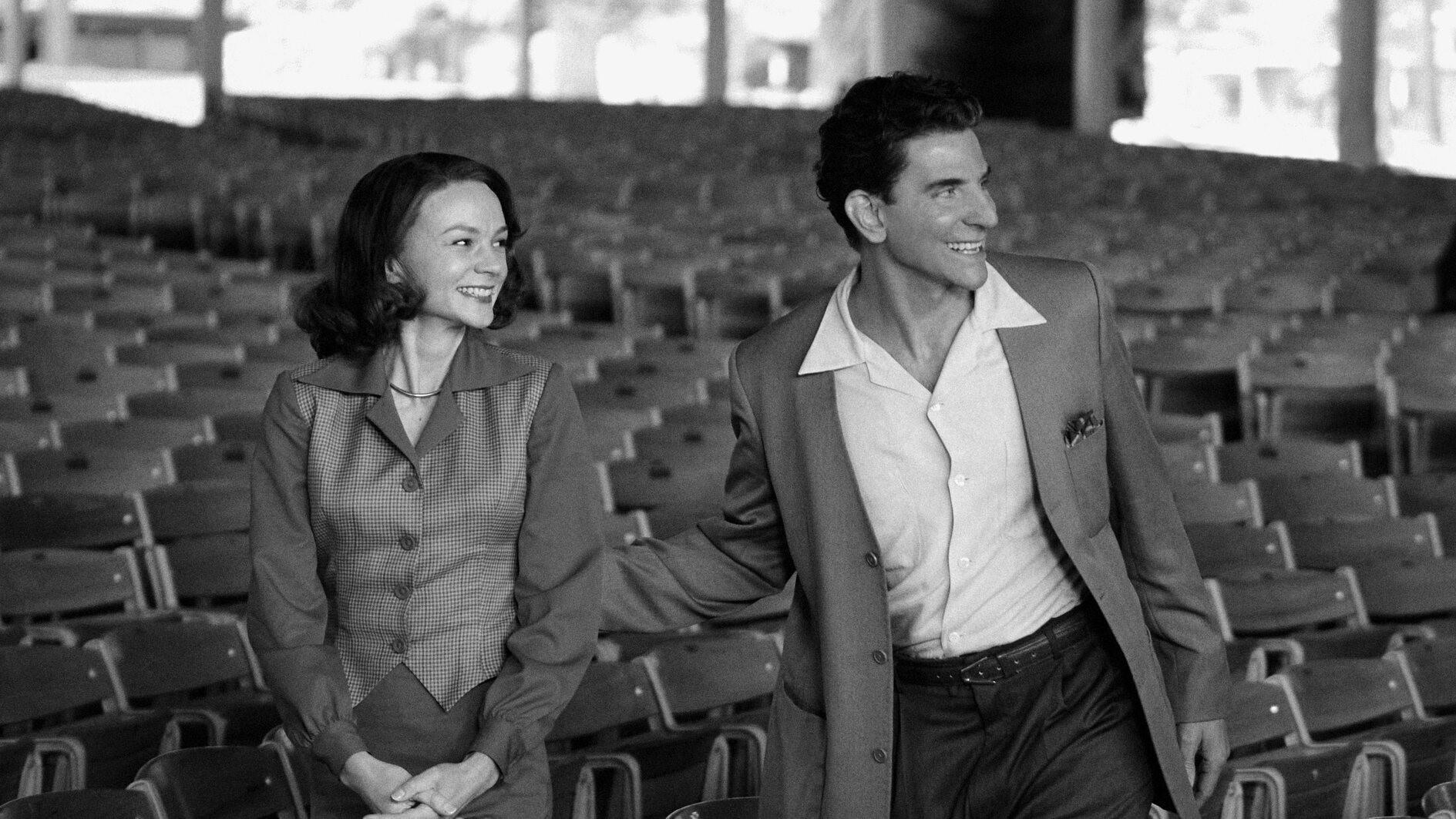
Maestro’ is, for this roughly first black-and-white hour, wonderfully brisk and free of normal biopic constraints. It’s like a dream of 1950s New York modernism
Bradley Cooper’s “Maestro,” a high-wire act of a biopic, leaps constantly between on stage and off, flying through Leonard Bernstein’s very public life as a conductor while diving into his more private marriage to Felicia Montealegre. How each side of Bernstein’s existence interacts with the other is the tension and harmony of “Maestro.” Which is authentic? Which a performance?
Resolving those dichotomies is not the aim of Cooper’s admirably ambitious if performative drama about the musical conscience of 20th century America. Bernstein’s polymorphous life was spread between his family life and a string of male lovers, just as it was between conducting and the solitary toil of composing. “Maestro” resists neat conclusions about any facet of an expansively contradictory life.
“If you carry around both personalities, I suppose that means you become a schizophrenic and that’s the end of it,” Bernstein (Cooper) says with a laugh in a TV interview alongside Montealegre (Carey Mulligan).
“Maestro,” which debuted yesterday in theaters before streaming next month on Netflix, isn’t a cradle-to-the-grave biopic, though it doesn’t avoid some of the genre’s standard pitfalls, either. It’s largely set around the beginning and end of his relationship with Montealegre, an actor he first meets at a party. ““Hello, I’m Lenny,” he says, grinning from the piano bench.
It’s a framework with some benefits - no matter what the title says, this is Mulligan’s movie - that also omits much of Bernstein’s most lasting accomplishments. There is little here of music making, generally, and virtually none of “West Side Story,” “Candide,” “On the Waterfront” or all those influential TV broadcasts. Fans such as Lydia Tár may not approve.
But “Maestro” begins, thrillingly, in a black-and-white blur. Characters exit scenes like they're falling through trap doors, a surreal swirl propelled by the verve of Bernstein’s music. In the first scene, a 25-year-old Bernstein is woken with a call notifying him to substitute for Bruno Walter in conducting the New York Philharmonic that night. Enthralled, he pulls open the blinds, slaps, in rhythm, the bare bottom of the man sharing his bed and runs down stairs that magically lead right into Carnegie Hall.
It won’t be the last time that “Maestro” draws a straight line between lovemaking and music. “If nothing sings in you, then you can’t make music,” Montealegre will later tell him. Music, no doubt, swells most in the Bernstein of “Maestro” when he’s liberated to be himself.
On the night of their first date, Bernstein and Montealegre end up, fittingly, on a stage running lines, with one floor lamp casting them in shadow. “Even though you’re the king, you’re quite taken with me,” she says, explaining his characterization.
The fiction is quickly borne out, albeit with a foreboding sense of marital trouble. Another headlong sprint between scenes ends with the two rushing onto the stage of “Fancy Free,” the Jerome Robbins ballet that will lead to “On the Town." Bernstein, himself, joins the hip-swinging sailors.
“Maestro” is, for this roughly first black-and-white hour, wonderfully brisk and free of normal biopic constraints. It’s like a dream of 1950s New York modernism. Dialogue moves at an urbane clip. The photography, by Matthew Libatique, dips confidently between intimate exchanges and wide-shot vistas of the Berkshires of Tanglewood or of Central Park.
When “Maestro” shifts forward and into color, it loses its brio. The film, which Cooper wrote with Josh Singer, skips over the central decades of Bernstein’s accomplishments, taking up residence instead in the early 1970s.
But Cooper, a sensitive director, was also wise enough to follow Mulligan’s increasingly moving performance. The film’s slide into family dynamics comes at the expense of Bernstein’s larger story, but it yields a beautiful platform for Mulligan to capture a woman too infatuated by her husband to abandon him, but too clear-eyed not to be devasted.
Some of America’s top filmmakers have long been tempted to tackle a film on Bernstein, among them Martin Scorsese and Steven Spielberg (both credited producers here). But Cooper’s film never finds its balance. If Bernstein's sexuality must be the prism through which we view him, why do his male lovers (Matt Bomer makes a brief impression) pass by so fleetingly? “Maestro” is a fine portrait of a complicated marriage. But for a man who contained symphonies, that leaves a lot of notes unplayed.